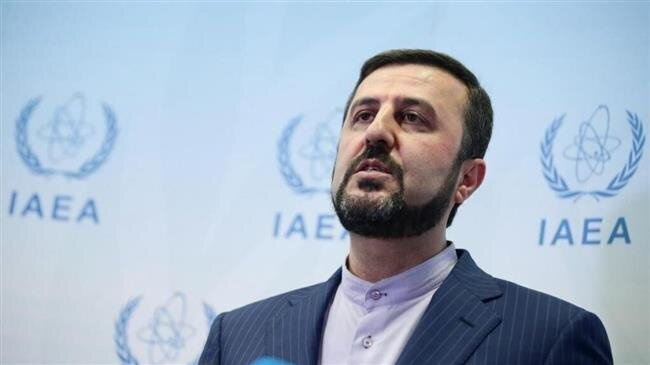Envoy criticizes IAEA chief over remarks on Iran nuclear program

“Drawing self-made criteria such as ‘breakout’ and ‘significant quantity’ for countries which are enriching uranium under the IAEA’s surveillance is non-relevant and has no status in the IAEA legal documents,” Kazem Gharibabadi stated on Sunday.
The remarks came after IAEA chief Rafael Grossi has said Iran is not in possession of enough enriched uranium to develop nuclear weapons.
“The Iranians continue to enrich uranium, and to a much higher degree than they have committed themselves to. And this amount is growing by the month,” Grossi said in an interview with Austrian paper Die Presse published on Saturday, Reuters reported.
Asked about Iran’s “breakout” time — the period it would take to produce enough nuclear material for one weapon — Grossi said, “In the IAEA we do not talk about breakout time. We look at the significant quantity, the minimum amount of enriched uranium or plutonium needed to make an atomic bomb. Iran does not have this significant quantity at the moment.”
Gharibabadi said that there are “more than 1300 tons of HEU and 300 tons of Plutonium in the world and according to the SIR 2019, total SQ also amounts to 216448 (8 pct more since 2015). What a dangerous world we are living in?!”
“Can Rafael Grossi tell us that what is the number of SQ for N5 and NNWSs such as the Netherlands, Germany, Japan, Brazil and Argentina. Better not to measure the activities under Safeguards in this way! Weapon/civilian grade material may be a better definition,” he added.
The Islamic Republic has repeatedly said that it has never sought and will never seek to build nuclear weapons. The decision, Tehran says, is based on a fatwa (religious decree) issued by Leader of the Islamic Revolution Ayatollah Ali Khamenei. The fatwa bans the production, possession and stockpiling of nuclear weapons and other weapons of mass destruction
Iran has also signed the nuclear Non-Proliferation Treaty (NPT) — whose aim is to prevent the spread of nuclear arms and weapons technology — in July 1968 and ratified it in February 1970.
In order to address the commotion created by the United States and its allies over the Islamic Republic’s nuclear program, Tehran signed a nuclear deal with six world powers in 2015. Under the deal, Iran agreed to limit its nuclear activities in exchange for a termination of sanctions.
However, in May 2018, President Donald Trump withdrew the U.S. from the deal, officially called the Joint Comprehensive Plan of Action (JCPOA), and restored the sanctions on Iran and added new harsh ones.
Source: Tehran Times

